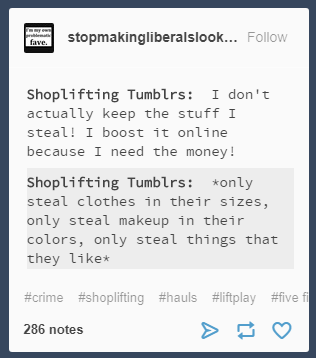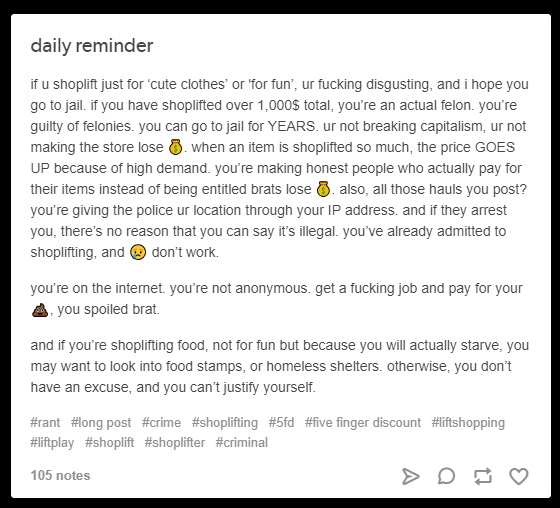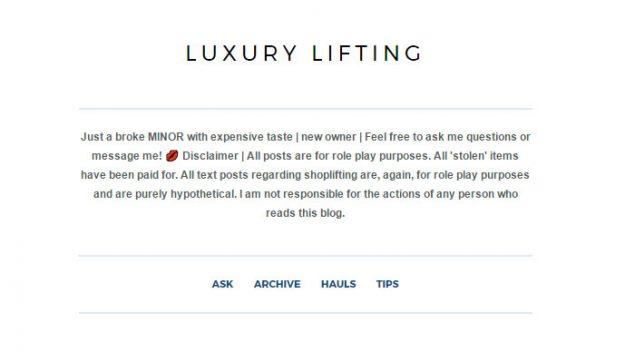
Lifting: a weapon against capitalism or boredom?
In 2014 a supposedly new trend surfaced from the depths of Tumblr: the (shop)lifting community. On Tumblr, you can find any niche group of people who share your interests, whether it concerns Bronies, eating disorders, or shoplifting. The lifting community is one of the weirdest and pettiest criminal divisions on the website. According to the users' bios, most lifters are high-school age, obsessively lifting and posting their hauls online. It is a subculture with intricate rules, cryptic lingo, and reversed hashtags like liftshopping to protect themselves and their fellow lifters.
Lifting today
The lifting community is still active even today, and teenagers are still blogging about their offline success. After a successful lift they post a haul online, where they show off pictures of the stolen goods and a complete list of targeted stores and product prices. On their blogs, lifters then calculate how much money they “saved” since they started shoplifting.
Figure 1 demonstrates what a typical lifting blog on Tumblr looks like. It shows an anonymized profile and cover photo, a main slogan, and a short profile description. It gives you the information the user wants to offer to understand their life. To understand that not all of them are white, privileged, teenage girls with too much time on their hands.
After a successful lift they post a haul online, where they show off pictures of the stolen goods and a complete list of targeted stores and product prices.
Other than their hauls, lifters also blog about the unspoken community rules, tips and tricks about different stores, their best concealing methods, how to avoid sales assistants, and the easiest ways to detach security tags. Using the right hashtags, everyone online can find these tutorials and posts, but also accounts the community is trying to hide.

Figure 1: Tumblr account description, Screenshot Tumblr 04.12.18
Hiding behind scripted identities
Social media create very specific ecologies in which people construct their identity in relation to certain interfaces. Tom van Nuenen (2016) calls this scripted identities: “The notion of the script implies that, within computational ecologies, users may register or subscribe to certain identity templates, formats, or ideal types – and conversely, to cast off their alternatives”.
The lifting community is clearly embedded in Tumblr and each member uses the available scripts to produce themselves as a lifter. They upload blogs and pictures, while at the same time they are aware of the fact that they provide the outside world with proof of their criminal deeds. Therefore the lifting community tries their hardest to hide their blogs from non-community members, to keep their illegal activities a secret from the offline world. They do so by hiding their real identities behind scripted identities.
Most of the usernames include the word 'lift', for example: bunbunlift or iliftweightsandmakeup. These names can be seen as forms of phatic communication. In using 'lift' in their usernames, they communicate themselves as part of the shoplifting community. This community holds itself together through certain characteristics: “one has to 'have' enough of the emblematic features in order to be ratified as an authentic member of an identity category” (Blommaert & Varis, 2015), in this case the lifting community. Other than the right username, the lifters also have to use the right tags and be active on their account. Posting and reposting frequently is the key to seeing new posts and being seen on the platform, the key to their popularity. Most of these blogs are side blogs to their main accounts on Tumblr.
Other than the right username, the lifters also have to use the right tags and be active on their account.
Another form of covering up their criminal behaviour is by masking it as roleplay. On most of these blogs you can read a disclaimer stating that the blog is not reflecting their real life, that everything is staged, and that they are only posted online for roleplay purposes. The lifters hope to throw law enforcement off their trail and to get around Tumblr’s community guidelines, which clearly state that illegal behaviour is banned on the site.
Tumblr is not doing anything about these blogs, because what these lifters are posting is not seen as illegal. An example of the kind of disclaimers given by the users is shown below in figure 2: a screenshot of an account named luxurylifting, which perfectly shows how lifters are avoiding the online consequences of their activity. The first sentence in the user's description indicates their financial state and what products they are lifting. "Broke minor with expensive taste", reveals that this user lifts mainly high-end products they want but do not need.
Figure 2: Tumblr account Luxury Lifting
There are not only possible online consequences. Lifters can of course also face offline consequences for their behaviour. Getting caught, either by their parents, friends, sales assistants, or the police is a big threat to lifters. The fear of getting caught can present itself as anxiety but can also cause a rush in users.
Connecting online
The Tumblr users have at least one thing in common: their subtle wish to connect and communicate online. The shoplifting community communicates through certain hashtags like lifting, five finger discount, liftblr, and liftshopping. They can thus categorize and always find reblogged posts by simply searching for a tag. The community helps each other in all kinds of different ways: they reblog important new information, warn each other when their posts are getting too obvious for the rest of Tumblr, ask questions, and support each other whenever they can.
Contrary to what one might think, these teenagers are not all white, privileged girls with rich parents. According to their blogs and bios, the community is more diverse and polycentric than one would think. Their countries of residence are spread all over the world. Only naming the most common areas seen online, users come from North America, Britain, Germany, and Australia.
Represented in this micro-population are a lot of teenage girls, but also boys, genderqueers, and members of the LGBTQ+ community are present. According to Maly and Varis micro-populations "are the material expression of temporary and emerging micro-hegemonies. They group people together by their ‘style’, by the places where they hang out and the places where you can’t find them" (Maly, Varis, 2015). Most of them are underage teenagers, but there are also young adults and single parents. Every single one of these people has their very own reason for risking their freedom, which is further elucidated below.
According to their blogs and bios their community is more diverse and polycentric than one would think. Their countries of residence are spread all over the world.
When looking at their differences in age and origin, we can establish that “some indexicals have become truly global, yet others work only on more local levels” (Maly, Varis, 2015). This means that we can identify different people as part of the lifting community even though they are from different countries or have a different motivation behind their criminal activity. It also shows that characteristics or indexicals can be more local. Perfect examples for this are specific threads and posts about shops and stores that only exist in certain countries, or information that is mainly valuable for a certain town or store. Lifters from the same area or city are connecting and exchanging local news and information. Their values might thus differ locally but come together globally.
Justifying their behaviour
Coming back to lifters' different motivations to participate in this illegal activity, one has to dig a bit deeper than usual. Analysing this ethnographically is complex, since “the ‘authenticity’ of information is of course a broader issue regarding online materials: it is sometimes difficult, if not impossible, to establish whether information is accurate or not …” (Varis 2016). The fine line between reality and fiction is not always that clear online, and it is difficult to be sure what the lifters really believe in or what they are just making up to cover their story.
While taking a look at the shoplifting accounts on Tumblr, it becomes obvious that every person has their own reason for shoplifting. The best-known motivation is the simple question of what to do when underaged teenagers are bored. These teenagers go lifting alone or with their partner in crime to use their spare time “wisely”. Most of them then boost (sell) the lifted items on the internet to make some extra cash.
The best-known motivation is the simple question of what to do when underaged teenagers are bored.
There are even more advanced ways to make money from shoplifting. One lifter on Tumblr suggested looking for receipts of goods paid with cash, then go find these exact articles, lift them, and return them to the shop to make a profit. This leads to the next motivation besides wasting time: making money back from stealing.
For the uninformed, this would be the most plausible explanation for kids stealing high-end clothes and make-up. But for most of them there is a deeper meaning behind stealing from big companies: they want to fight capitalism. The online magazine Medium published a relevant Tumblr quote on their website to demonstrate exactly this issue:
“Many of the lifters argue that what they do undermines a capitalist system that victimizes workers and exploits consumers. ‘I kind of lift with a Robin Hood philosophy,’ Barbie says. Sometimes she gives the things she lifts to family and friends. Sometimes she keeps them for herself. ‘I essentially believe: take from the rich, give to the poor and f**k capitalism,’ she writes in an ‘about me’ section on her blog. ‘I’m a democratic socialist and think capitalism is a plague to America.’ And then, an addendum: ‘yes I still am a greedy materialistic person. But it’s okay because I’m self aware!’”
The online platform Vice quoted from one lifter's account, harleyandivy-lift: "don't tell me I can't steal from million dollar companies that steal from you". The question here is if these lifters are really fully supporting this idea, or if they are just using it to defend themselves online.
The underlying issue of our consumerist society could be the main reason for these users to lift high-end products like make-up and clothing. The struggle of always keeping up with the newest trends, fashion standards, and online beauty influencers pressures them to steal what they 'need' to fit in. Teenagers nowadays are expected to live up to an impossibly expensive consumerist ideal.

Figure 3: The underlying issue of consumerism, Screenshot Tumblr 02.12.18
In figure 3 we find an anti-lift statement. It perfectly shows the identity performance of lifters on Tumblr. According to Wikipedia, identity performance is a "conscious effort or action taken to present oneself in social interactions". Lifters use different alleged reasons to present themselves and their identity online to others. It is a constant identity discourse, trying to fit in, be and most importantly stay a part of their micro-population.
Criticising the lifting community
The criticism on the lifting community on Tumblr itself and other online platforms is enormous. There are endless posts and anti-blogs, which are either pure satire or straight up honest like figure 4 shows. Other users are mainly criticising the lifters for pretending they are not doing any damage to the employees of the shops they steal from.
With their goal to destroy capitalism and only hurt the big companies and employers high up the ladder, lifters try to convince other people on Tumblr of their mission. However, most other users fight back with explanatory posts, which are created to open lifters’ eyes about the consequences of shoplifting. Stores raising prices to compensate for their loss, or letting employees go when the loss is getting too big and the wages too high to cover. Users also give advice on what lifters can do when they are actually in need of help and what options they have other than stealing food or goods and boosting them online.
Users are begging lifters not to pretend that they are poor and really are in need of all the luxury items they are stealing.
Tumblr user Tomblr-in-action wrote the following: “People who need to steal aren’t the ones posting about it on the internet. They’re keeping a low profile, because in their minds, that’s the only option left to them and God forbid they should get caught or go to jail, especially if they’re stealing to take care of their family. These people know what they’re doing is wrong ...”.
Users are begging lifters not to pretend that they are poor and in need of all the luxury items they are stealing. Their identity discourse is exactly what other users criticise about lifters online: they show off their stolen goods to present a tough and desirable lifestyle, which could be fatal for younger kids. If you have to do it to survive, do it, they argue, but leave the internet out of it. Stop influencing children and other teenagers to go down the same path and eventually get caught committing a crime.

Figure 4: A daily reminder not to shoplift, Screenshot Tumblr 04.12.18
Fighting or supporting the community
All in all, the lifting community on Tumblr is a very broad, diverse, and layered group. Lifters are still frequently active in online posting their hauls, tutorials, and requests for help. But is it a fight against capitalism or merely a fight against boredom? As illustrated, the answer is not an easy one: behind these users’ hidden identities are mostly young users who want to belong to a community, speak up, and be included. Although they have different motivations for their actions, we can question whether their behaviour is glamorising crime for younger children, or if one can distinguish between online blogs and reality.
However, the fact that they are committing a crime and are actually stealing cannot be excused by trying to fight capitalism or fit into our society controlled by consumerism. An online platform like Tumblr should not be a place for any kind of criminal activity to arise.
References
Alice Newell-Hanson - Inside tumblr’s teen shoplifting rings, 2015
Blommaert & Varis - Culture as accent: The cultural logic of Hijabistas. Semiotica 203: 153-177, 2015
Howard Becker - Outsiders, 1963
Maly & Varis - The 21st century hipster: On micro-populations in times of superdiversity. European Journal of Cultural Studies, 19(6), 637-653, 2016
Piia Varis - "Digital ethnography", in The Routledge Handbook of Language and Digital Communication . Georgakopoulou, A. & Spilioti, T. (eds.). London : Routledge, p. 55-68, 2016
Sarah Gustafson - What shoplifting millennials teach us about anti-capitalist attitudes, 2016
Van Nuenen, T. - Scripted Journeys: A study on interfaced travel writing. S.l.: [s.n.], 2016
Wikipedia - Bronies
Wikipedia - Identity performance
